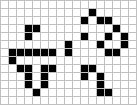Phase
A phase is a representative generation of a periodic object such as an oscillator or spaceship. The number of phases is equal to the period of the object. The phases of an object usually repeat in the same cyclic sequence forever, although some perturbations can cause a phase change.
Phase change
A phase change is a perturbation of a periodic object which causes the object to skip ahead by one or more phases. If the perturbation is repeated indefinitely, this can effectively change the period of the object. An example of this phenomenon, found by Dean Hickerson in November 1998, is given by 28P7.1. In that example, the period of the oscillator is normally 7, but with the addition of a nearby mold its period is increased to 8 because of the repeated phase changes caused by the mold's spark.
 28P7.1 alone is a period 7 oscillator |
 When a mold is added it becomes a period 8 oscillator |